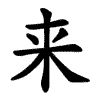来
| ||||||||
Translingual
| Traditional | 來 |
|---|---|
| Simplified | 来 |
| Japanese | 来 |
| Korean | 來 |
| Stroke order | |||
|---|---|---|---|
| Stroke order | |||
|---|---|---|---|
 | |||
Glyph origin
Variant of 來.
Han character
来 (Kangxi radical 75, 木+3, 7 strokes, cangjie input 木廿 (DT), composition ⿻未丷 or ⿻木䒑 or ⿻一米)
References
- Kangxi Dictionary: not present, would follow page 513, character 1
- Dai Kanwa Jiten: character 14489
- Hanyu Da Zidian (first edition): volume 1, page 21, character 9
- Unihan data for U+6765
Chinese
| For pronunciation and definitions of 来 – see 來 (“to come; to arrive; to happen; to occur; etc.”). (This character is the simplified and variant form of 來). |
Notes:
|
Japanese
| 来 | |
| 來 |
Readings
Etymology 1
| Kanji in this term |
|---|
| 来 |
| らい Grade: 2 |
| on’yomi |
| Alternative spelling |
|---|
| 來 (kyūjitai) |
From Middle Chinese 來 (MC loj).
Derived terms
Suffix
来 • (-rai)
- since..., in...
- 1944, Osamu Dazai, Tsugaru:
- この二、三年来、私は青森市へ二、三度行ったが...
- Kono ni, sannen-rai, watashi wa Aomori-shi e ni, sando itta ga
- I went to Aomori two or three times in the past two or three years...
- この二、三年来、私は青森市へ二、三度行ったが...
- Kono ni, sannen-rai, watashi wa Aomori-shi e ni, sando itta ga
- I went to Aomori two or three times in the past two or three years...
- (please add an English translation of this quotation)
Affix
来 • (rai)
Derived terms
Derived terms
- 来意 (raī)
- 来客 (raikyaku)
- 来迎 (raigō)
- 来書 (raisho)
- 来状 (raijō)
- 来信 (raishin)
- 来世 (raise)
- 来日 (rainichi)
- 来賓 (raihin)
- 来訪 (raihō)
- 来由 (raiyu)
- 来歴 (raireki)
- 以来 (irai)
- 遠来 (enrai)
- 往来 (ōrai)
- 外来 (gairai)
- 元来 (ganrai)
- 近来 (kinrai)
- 古来 (korai)
- 再来 (sairai)
- 在来 (zairai)
- 爾来 (jirai)
- 襲来 (shūrai)
- 従来 (jūrai)
- 招来 (shōrai)
- 将来 (shōrai)
- 新来 (shinrai)
- 生来 (seirai)
- 帰来 (kirai)
- 去来 (kyorai)
- 光来, 高来 (kōrai)
- 伝来 (denrai)
- 渡来 (torai)
- 当来 (tōrai)
- 到来 (tōrai)
- 淘来 (tōrai)
- 年来 (nenrai)
- 舶来 (hakurai)
- 飛来 (hirai)
- 本来 (honrai)
- 未来 (mirai)
- 夜来 (yarai)
- 由来 (yurai)
- 帰去来 (kikyorai)
Proper noun
来 • (Rai)
Etymology 2
| Kanji in this term |
|---|
| 来 |
| く Grade: 2 |
| kun’yomi |
| Alternative spelling |
|---|
| 來 (kyūjitai) |
From Old Japanese 來 (ku).
Verb
来 • (ku) intransitive †-ko
- (archaic, obsolete) to come (approach one’s position from a remote location, specifically towards the speaker)
- (archaic, obsolete) to go (to a direction or place far from the speaker but near the listener)
- (archaic, suffixed to the 連用形 (ren'yōkei, “stem form”) of a verb) to gradually begin to [verb]
Conjugation
Classical conjugation of "来" (カ行変格活用, see Appendix:Japanese verbs.)
| Stem forms | ||||
|---|---|---|---|---|
| Irrealis (未然形) | 来 | こ | ko | |
| Continuative (連用形) | 来 | き | ki | |
| Terminal (終止形) | 来 | く | ku | |
| Attributive (連体形) | 来る | くる | kuru | |
| Realis (已然形) | 来れ | くれ | kure | |
| Imperative (命令形) | 来 来よ | こ こよ | ko koyo | |
| Key constructions | ||||
| Negative | 来ず | こず | kozu | |
| Contrasting conjunction | 来れど | くれど | kuredo | |
| Causal conjunction | 来れば | くれば | kureba | |
| Conditional conjunction | 来ば | こば | koba | |
| Past tense (firsthand knowledge) | 来し[1] 来し[1] | こし きし | kosi kisi | |
| Past tense (secondhand knowledge) | 来けり | きけり | kikeri | |
| Perfect tense (conscious action) | 来つ | きつ | kitu | |
| Perfect tense (natural event) | 来ぬ | きぬ | kinu | |
| Perfect-continuative tense | 来たり | きたり | kitari | |
| Volitional | 来む | こむ | komu | |
| [1]Attributive form, as the terminal form (lemma) does not exist for this construction in this conjugation. | ||||
This article is issued from Wiktionary. The text is licensed under Creative Commons - Attribution - Sharealike. Additional terms may apply for the media files.